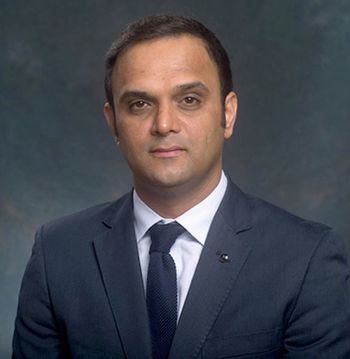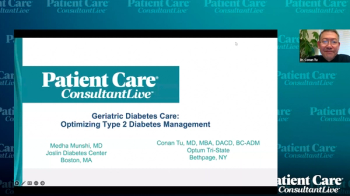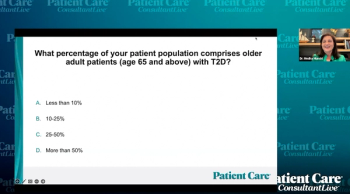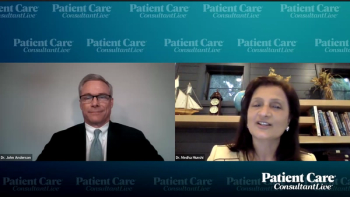
A false positive finding on a screening mammogram is fairly common, according to UC Davis biostatistician Diana Miglioretti, PhD. Here's why.

A false positive finding on a screening mammogram is fairly common, according to UC Davis biostatistician Diana Miglioretti, PhD. Here's why.

The group of women least likely to return for a regular preventive screening mammogram after a false positive result surprised this primary investigator.

After a false positive outcome on screening mammography, a short interval call back for repeat imaging was a significant deterrent to future screening.

The most common harm associated with breast cancer screening is a false positive finding; this UC Davis expert wanted to know more about how women respond.

Surya Bhatt, MD, MSPH, is coprincipal investigator for the 2 pivotal phase 3 clinical trials that supported today's landmark FDA approval of dupilumab for COPD.

JoAnn Pinkerton, MD, details the positive findings from the OASIS 1, 2, and 3 studies of elinzanetant and highlights next steps in research.

Experts on diabetes provide insights gleaned from the SIMPLE study and outline patient factors that inform treatment decisions.

Medha Munshi, MD, leads a comprehensive discussion on diabetes treatment practices and discusses the role of deprescribing and other treatment adjustments in older adult patients.

Continuing the discussion on a 68-year-old patient, the panel discusses the importance of follow-up and the benefits of combination therapies in older adults.

Focusing on diabetes testing and treatment practices, Conan Tu, MD, MBA, DACD, BC-ADM, presents the profile of a 68-year-old new patient who presents with symptoms in line with a family history of type 2 diabetes.

Conan Tu, MD, MBA, DACD, BC-ADM, presents a case of an 84-year-old patient with diabetes experiencing medication burden and glycemic control challenges.

Experts on diabetes define the concept of homeostenosis and describe the importance of recognizing signs of aging and adapting care to fit the needs of older adult patients.

Medha Munshi, MD, and Conan Tu, MD, MBA, DACD, BC-ADM, begin a discussion on geriatric diabetes care by providing an overview of the condition and gauging physician knowledge with polling questions.

More than 6 in 10 adults treated with the investigational CRF1 antagonist crinecerfont reached a physiologic glucocorticoid dose with androstenedione control maintained.

Dr Richard Auchus says the ideal treatment for congenital adrenal hyperplasia is a long way off but describes a "block and replace" strategy that holds great promise.

Crinecerfont, a CRF1 antagonist, could help reduce glucocorticoid doses for individuals with CAH and improve physical and emotional quality of life, says leading researcher.

The approval of neffy (epinephrine nasal spray) could help individuals and caregivers act sooner and feel safer treating a type 1 allergic reaction.

Steven Furr, MD, discusses how communication between clinicians and patients is crucial to combatting vaccine hesitancy this upcoming respiratory virus season.

Richard J Auchus, MD, PhD, a preeminent steroid biologist, provides a concise and thorough primer on CAH and the challenges in managing the disorder safely and effectively.

The medical experts conclude by summarizing essential insights and practical tips for effectively managing diabetes in elderly patients.

Medical professionals evaluate strategies for optimizing diabetes treatment protocols in older adults, emphasizing the critical role of deprescribing in geriatric diabetes care.

Diabetes specialists examine the shifting paradigm of type 2 diabetes treatment, highlighting the role of combination therapies and emerging approaches specifically designed for geriatric patients.

The panel examines crucial factors in determining appropriate medication dosages and managing glucose levels for elderly patients with type 2 diabetes.

Medical experts analyze a case involving a 78-year-old man with a 15-year history of Type 2 Diabetes Mellitus.

A panel of medical experts presents a case study featuring a 68-year-old woman exhibiting classic diabetes symptoms—polyuria, polydipsia, and significant weight loss—along with a notably elevated glucose level of 458 mg/dL.

Medical doctors examine strategies for customizing diabetes care for older adults across various environments, from home settings to healthcare facilities.

Medical experts explore personalized diabetes management strategies, emphasizing the critical need to tailor treatments for older adults.

The panel concludes its discussion with key takeaways on the optimal care of patients with type 1 diabetes care and thoughts on unmet needs within the treatment space.

Focusing on logistical matters as it pertains to teplizumab administration, the panel discusses infusion site considerations, insurance coverage hurdles, and the process of getting patients approved.

Diabetes specialists outline the patient selection protocol for teplizumab and describe the teplizumab infusion process.